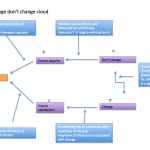In Part 2 we look at how cause-and-effect reasoning and acknowledging our ‘cognitive constraints’ are crucial in understanding why, when, what and how to change. Dr. W. Edwards Deming used to warn about the consequences (cause and effect) of seemingly simple actions: “if we kick a dog in the street, we are responsible for the […]
Why Change? Part 1
In our previous post we looked at tools for the three phases of change (What to Change, What to Change to and How to Make the Change Happen). This post is in response to several comments that asked about the ‘why’ of change. Dr. W. Edwards Deming used to say: “The only thing that does […]
Change: Tools for Thinking, Planning and Enacting Change
Continuing our series on Change. In our previous post, we mentioned the three phases of change: what to change what to change to how to make the change happen For each of these phases, there is a powerful Thinking Process Tool from the Theory of Constraints (TOC). Let’s look at the three phases. What to […]
Change: Intuition, Understanding and Knowledge
Continuing our series on change. We live in an extraordinarily complex, post-digital world, where interdependencies and interconnections multiply at an ever-increasing speed. The cause-effect relationships that govern the world as we experience it create a super intricate ‘network of networks’ and we have a very limited understanding of the underlying properties of these networks and […]
Change: Control vs. Vision in our decisions to change
Change: Why do people find it so hard (and what can we do about it)?
In our next few posts we will be looking at the difficulty we have to change, and how we can achieve change and improve our systemic intelligence. Change is the most unchanging part of our existence: • our pancreas replaces most of its cells every 24 hours • the cells of our stomach lining are […]
Educating for complexity: How do we transform schools into centres of innovation?
“The challenge we face is nothing less than transforming our schools from assembly-line factories into centers of innovation.” Those are the words of Michael Bloomberg, Mayor of New York City where the iZone project is transforming education. Clearly, the 19th style classroom and methods are not cutting it for the challenges of today. The iZone […]










